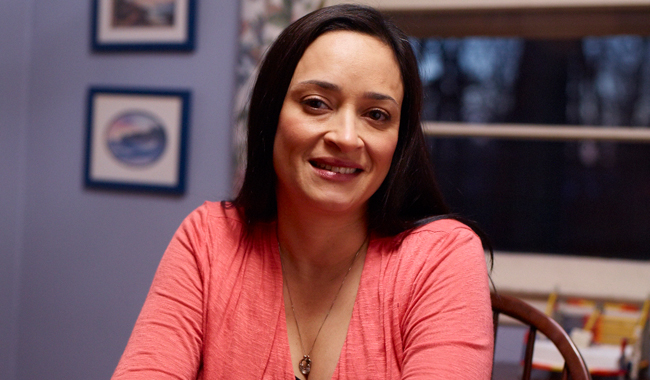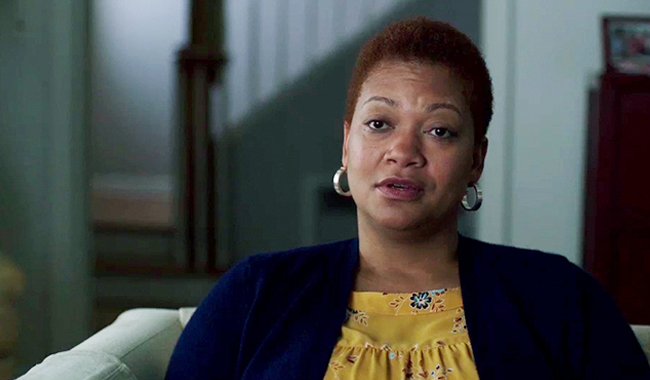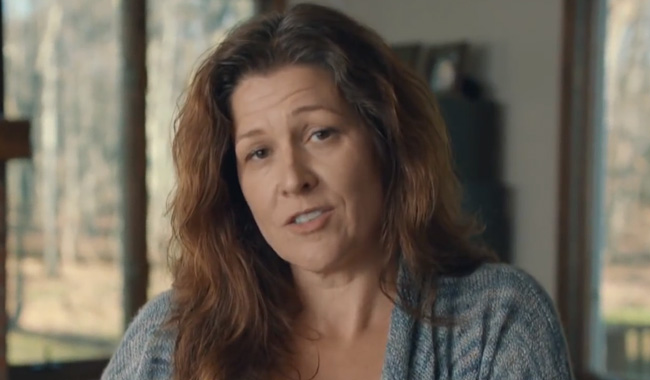Angie P.’s Story

Angie, age 62, grew up in the Cincinnati area as the middle daughter of two preachers. She started smoking menthol cigarettes at age 15 because she watched her mother smoke. She wanted to mimic what she thought was adult behavior. This began a struggle with nicotine addiction that would last 26 years.
Growing up, Angie never felt like she belonged in her family or her community. She realized from a young age that she liked girls, and she thought being gay would be difficult for her family to accept. When she felt angry or hurt, she would smoke menthol cigarettes to try to feel better.
After high school, Angie moved to Las Vegas to pursue a career as a professional singer. Smoking was common in the nightclubs and casinos where she performed, as were alcohol and other drugs. Angie started drinking heavily and using drugs. Angie’s life spiraled out of control, and for two years, she lived on the street. At the age of 32, she was able to get professional help to end her alcohol and substance use. But the one addiction she continued to struggle with was smoking. It would be another nine years before Angie quit smoking for good.
Today, Angie shares her recovery story to help others fight their own substance use. “My hope is to help other people, especially LGBTQ+ people, understand what the tobacco companies are trying to do with their advertising, and tell them it’s not worth it to smoke,” Angie said. “Their lives and their health are worth more.”
Some of the people featured in the Tips From Former Smokers® (Tips®) campaign used to think cigarettes were their “best friend.” In this ad, they talk about needing a better friend.
Persons with disabilities experiencing problems accessing these videos should contact CDC-INFO at CDC-INFO email form: https://www.cdc.gov/info, 800-232-4636 or the TTY number at (888) 232-6348 and ask for a 508 Accommodation PR#9342. If emailing please type “508 Accommodation PR#9342” without quotes in the subject line of the email. Please include the URL of the site in the Subject line of your email request that you would like to access.
View more Tips videos sorted by name, disease and specific groups
Angie P.’s Biography
Angie, age 62, began smoking menthol cigarettes at the age of 15. Her mother smoked them, and Angie wanted to mimic what she thought was adult behavior. “There was this whole image that went with smoking,” Angie said. “When I was younger, it was what I saw my mom do, and she was a beautiful woman. All I saw was a classy chick and a cigarette.”
Growing up near Cincinnati as the middle daughter of two preachers, Angie always felt different. She never felt like she belonged in her family or her community. She knew she liked girls, and she thought being gay would be difficult for her family to accept. In high school, Angie started hanging out with friends who smoked cigarettes and drank alcohol.

“Trust me, it was rough,” she said. Angie realized that she would light a cigarette every time she felt hurt or angry, smoking up to two packs a day as a teenager. She connected feeling better with the “cooling” sensation from smoking a menthol cigarette.
After high school, Angie moved to Las Vegas to launch a professional singing career. She often performed onstage in casinos and nightclubs with a cigarette in her hand. She started drinking heavily and using other drugs. Angie’s substance use overtook her life, and for two years she lived on the street. At age 32, realizing how much pain her substance use brought her, Angie reached out for professional help and was able to end her alcohol and substance use. But the one addiction she continued to struggle with was smoking.
Her singing voice suffered as well. After years of smoking regularly, Angie had trouble holding notes or keeping her voice clear. “It was ridiculous, the way I was living,” she said. “And I’m paying for it now.”
When she was 41 years old, Angie overheard a conversation at a restaurant that would change her life. A group of people were talking about a program that used a quit-smoking medicine called bupropion. Inspired, Angie immediately left the restaurant and signed up to participate in the program. Within a week of joining, Angie quit smoking for good.
Today Angie shares her recovery story publicly to help others struggling with substance use. She believes it’s vital to help people cope without depending on cigarettes, alcohol, or drugs. Angie has also become aware of the tobacco industry’s aggressive advertising of cigarettes, especially menthol cigarettes, and particularly to reach LGBTQ+ communities and communities of color. As someone who is gay and African American, Angie feels the tobacco companies took advantage of her to profit from a harmful product.
“My hope is to help other people, especially LGBTQ+ people, understand what the tobacco companies are trying to do with their advertising. I’d tell them it’s not worth it to smoke,” Angie said. “Their lives and their health are worth more.”









